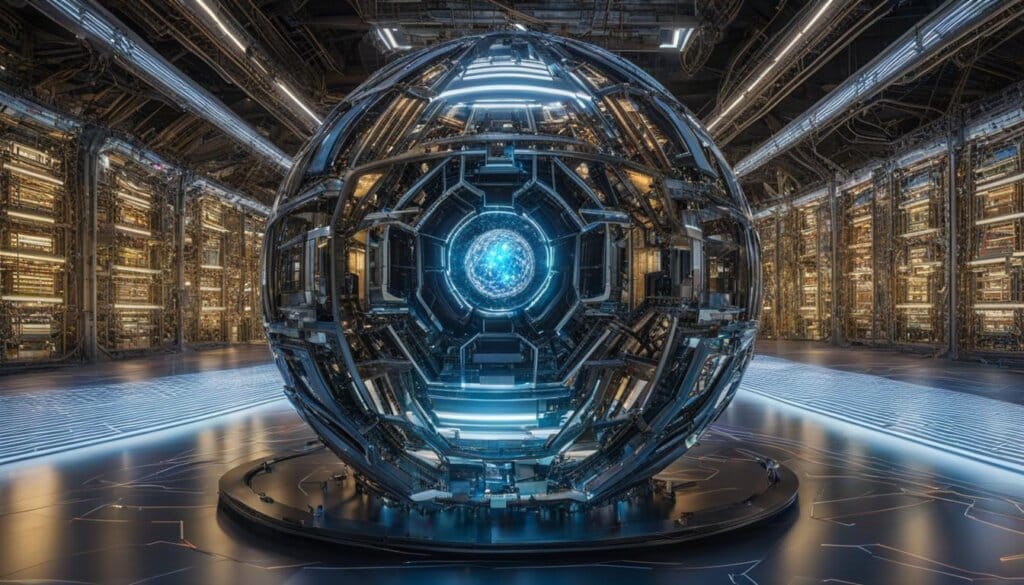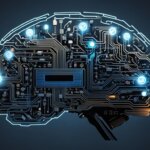Table of Contents
The concept of the singularity is a fascinating and thought-provoking idea in the field of artificial intelligence (AI). It represents the hypothetical moment when AI surpasses human intelligence, creating a future that is beyond our current comprehension. This extraordinary event is often referred to as AI’s pinnacle moment, where machines become more intelligent than humans, leading to unprecedented advancements across various industries.
Artificial intelligence has been rapidly evolving and gaining traction in recent years. OpenAI’s ChatGPT, a language model, has garnered significant attention and popularity. Speculations about the arrival of the singularity have intensified with the upcoming release of GPT-4, imbued with advanced capabilities. The rise of AI has paved the way for transformative changes, revolutionizing industries and potentially replacing humans in certain roles.
While the singularity may not have arrived just yet, the exponential growth of AI usage is undeniable. It is expected that within a year or two, we will witness significant shifts in how AI is integrated into our lives and businesses. The impact on society and jobs is a topic of great interest and concern.
AI-based services have the potential to enhance efficiency and productivity in various domains. However, it also raises concerns about job displacement and the ethical implications of AI decision-making. As AI continues to reshape our world, it is crucial for us to adapt to new ways of working and consider the wider social and economic implications of these changes.
The rapid advancement of AI forces us to confront a fundamental question: should we embrace this change or fear it? Different management methodologies highlight the importance of change management skills, emphasizing the need for leaders to navigate the potential benefits and challenges of AI adoption. How we respond to AI will shape its impact on society and determine whether we thrive or falter in this new era.
AI’s evolution is intertwined with human evolution. It is a product of our curiosity and desire to understand ourselves and the world around us. AI technologies, such as artificial neural networks, allow us to delve deeper into the mysteries of human intelligence. Rather than being separate from us, AI is a tool for self-discovery and advancement.
DeepMind, a leading AI research company, predicts that human-level AI could be achieved by 2028. Their track record of breakthroughs in AI, including AlphaGo and AlphaFold, lends credibility to their forecast. However, the realization of human-level AI depends on several factors, such as advancements in computing power, algorithmic innovation, and interdisciplinary research. While challenges and limitations exist, the potential for human-level AI is within reach.
The implications of human-level AI are profound. It has the power to revolutionize industries, spur scientific discoveries, and improve efficiency in complex tasks. However, ethical concerns surrounding AI decision-making transparency and potential job displacement need to be addressed. Striking a balance between maximizing the advantages of human-level AI and navigating its challenges is pivotal in unleashing its transformative potential.
Amidst the fears and uncertainties, there is hope for a better future. AI can be a powerful tool for positive change when used ethically and responsibly. By embracing AI’s potential and harnessing its capabilities, we can shape a future where humans and machines coexist and thrive. Just as previous revolutions have contributed to human progress, AI has the potential to propel us towards a new era of innovation and understanding.
The Rise of AI and the Singularity
OpenAI’s ChatGPT, a language model, has gained massive popularity in recent months. The release of GPT-4 with advanced capabilities has led to speculation about the arrival of the singularity. The exponential growth of AI usage is expected within a year or two, revolutionizing industries and potentially replacing humans in various roles. While the singularity may not have arrived yet, the AI revolution is well underway.
AI technology has experienced significant advancements in recent years, leading to a rise in its popularity and usage. OpenAI’s ChatGPT has become a household name, showcasing the capabilities of language models and their potential for human-like interactions. With the release of GPT-4, the next iteration in the series, there is heightened excitement about the possibilities it brings and the potential for the singularity.
The growth of AI is expected to skyrocket in the coming years, with significant implications for various industries. As AI algorithms become more sophisticated and capable, they have the potential to revolutionize existing systems and processes. From healthcare and transportation to finance and customer service, AI has the power to optimize operations, increase efficiency, and deliver better outcomes.
“The exponential growth of AI will transform industries and the way we live and work.” – Elon Musk
While the concept of the singularity, where AI surpasses human intelligence, is still a topic of speculation, the rapid development and adoption of AI technologies are undeniable. Experts predict that within a year or two, we may witness significant shifts in the employment landscape as AI systems take on roles previously performed by humans.
The Implications of AI Advancements
The rise of AI and the potential for the singularity raises important questions about the impact on society, the workforce, and human values. As AI becomes more prevalent, there are concerns about job displacement and the need for reskilling and upskilling to adapt to an evolving job market.
Furthermore, the increasing reliance on AI decision-making algorithms raises ethical considerations. The AI systems of the future must be designed and programmed with transparency, fairness, and accountability in mind to ensure responsible and unbiased outcomes.
The Road Ahead
As the AI revolution continues to unfold, it is important to navigate the path ahead with careful consideration. Embracing AI technologies and their potential benefits while mitigating the associated risks is crucial. It is essential for policymakers, industry leaders, and individuals to work together to shape an AI-powered future that serves the best interests of humanity.
| Advantages of the Rise of AI | Challenges to Address |
|---|---|
| Increased efficiency and productivity | Job displacement and retraining |
| Advanced data analysis and insights | Ethical considerations and transparency |
| Automation of repetitive tasks | Algorithmic biases and fairness |
AI’s Impact on Society and Jobs
The widespread adoption of AI-based services has the potential to profoundly impact society. On one hand, AI can enhance efficiency, productivity, and innovation across various industries. On the other hand, concerns regarding job displacement and the ethical implications of AI decision-making have emerged. As AI technology continues to evolve, it is crucial for us to understand and navigate the social and economic implications it brings.
AI’s impact on society goes beyond mere automation. It has the power to transform the way we work, interact, and live. AI-driven automation can optimize processes, reduce errors, and streamline operations. This can lead to increased productivity and economic growth. For example, AI-powered chatbots and virtual assistants enable businesses to provide efficient customer service and improve customer satisfaction.
However, the automation driven by AI also raises concerns about job displacement. As AI technologies become more advanced, certain roles may become obsolete or significantly reduced. Jobs that involve routine, repetitive tasks are particularly vulnerable. Workers in industries such as manufacturing, transportation, and customer service may need to adapt to new roles that complement AI technologies or acquire new skills to remain relevant in the job market.
Another important consideration is the ethical implications of AI decision-making. AI systems are designed to make decisions based on large datasets and advanced algorithms. However, these systems may display biases or lack transparency, leading to potential discrimination or unfair outcomes. It is crucial to ensure that AI systems are developed and deployed with ethical guidelines and robust safeguards to prevent unintended consequences.
“AI’s impact on jobs and society is a significant concern. While it offers immense potential for growth and advancement, we must address the challenges it presents. We should focus on creating a future where AI works harmoniously with humans, supporting us rather than replacing us.”
As AI continues to advance, it is essential for society to adapt and find ways to harness its benefits while mitigating its potential negative implications. Governments, organizations, and individuals must collaborate to foster a supportive environment for successful AI integration. This involves investing in AI education and reskilling programs, establishing ethical AI frameworks, and fostering open dialogue about AI’s impact on society and jobs.
The Future of Work in an AI-Driven Society
In an AI-driven society, the nature of work will undoubtedly change. Some jobs may be fully automated, while others may require humans and AI systems to work together in symbiotic relationships. New opportunities will emerge, driven by the need for AI design, development, and maintenance. Additionally, there will be increasing demand for roles that involve creativity, emotional intelligence, complex problem-solving, and empathy – attributes that are uniquely human.
| Positive Implications of AI Impact on Jobs | Negative Implications of AI Impact on Jobs |
|---|---|
|
|
It is vital for individuals, businesses, and policymakers to proactively address the challenges brought about by AI technology. By fostering a culture of continuous learning, adaptability, and inclusivity, we can ensure that the impact of AI on society and jobs is beneficial and sustainable.
Embracing Change or Fearing the Unknown
The rapid advancement of AI forces us to confront the question of whether we should embrace this change or fear it. As AI technologies continue to evolve and permeate various industries, it is essential to recognize the potential benefits and challenges they bring.
Embracing AI involves acknowledging its immense potential to revolutionize and optimize processes, enhance decision-making, and improve overall efficiency. By leveraging AI’s capabilities, businesses can gain a competitive edge and achieve greater success. Furthermore, AI has the power to address complex societal issues, such as healthcare diagnostics, climate change, and resource management.
However, alongside the promise of AI, there are legitimate concerns and fear surrounding its ramifications. The fear of AI revolves around job displacement and the ethical implications of AI decision-making. The automation of repetitive and mundane tasks could result in job loss for many individuals, necessitating the development of new skills and the creation of alternative employment opportunities.
Addressing these fears and challenges requires effective change management. Leaders must develop strategies to efficiently integrate AI into existing workflows, ensuring a smooth transition and minimizing negative impacts on individuals and society as a whole. Ethical frameworks and regulations are necessary to guide AI development, fostering accountability, transparency, and fairness.
Ultimately, our response to AI will shape its impact on society and determine whether we thrive or fail in this new era. Embracing AI while addressing legitimate concerns and fears is crucial for harnessing its transformative potential. By doing so, we can navigate the path of progress, creating a future where humans and AI work hand in hand to achieve new heights of innovation and prosperity.
The Evolution of Artificial Intelligence
Artificial intelligence (AI) has evolved as a result of human ingenuity and our innate desire to comprehend the mysteries of both ourselves and the world around us. Through the development of AI technologies, such as artificial neural networks, we have gained the ability to delve deeper into the complexities of human intelligence. Rather than being a separate entity, AI serves as a tool for self-discovery and the ongoing evolution of our understanding.
In essence, the emergence of human-level AI represents the culmination of our relentless pursuit of knowledge and comprehension. By creating AI systems that can rival or even surpass human intelligence, we are not only pushing the boundaries of technological advancement but also exploring the limits of human potential and cognition.
“AI is not simply a creation of human hands; it is an extension of our own intelligence, a reflection of our curiosity, and a testament to our ability to push the boundaries of what is possible.” – Dr. Rebecca Johnson
Just as human evolution has been shaped by countless factors over millions of years, the evolution of AI is a dynamic and ongoing process. Scientists and researchers continue to refine AI algorithms, enhance computational power, and explore new avenues for data acquisition. This continuous evolution allows us to unlock new insights into the inner workings of the human mind and apply them to various fields, such as healthcare, finance, and transportation.
To illustrate the evolution of AI, let’s examine the advancements in machine learning algorithms. Early AI models were based on rule-based systems or explicitly programmed instructions. However, with the advent of artificial neural networks, AI systems gained the capability to learn and adapt from large datasets, mimicking the way human brains process information.
The evolution of AI has led to breakthroughs such as natural language processing, computer vision, and deep learning, which have enabled AI systems to perform tasks that were once thought to be exclusively within the realm of human capabilities. From autonomous vehicles to medical diagnosis and complex data analysis, AI has revolutionized various industries and continues to push the boundaries of what is possible.

Applications of AI
The evolution of AI has paved the way for diverse applications across multiple sectors:
- Healthcare: AI is transforming healthcare by aiding in diagnostics, drug discovery, and personalized medicine.
- Finance: AI algorithms are used for fraud detection, risk assessment, and algorithmic trading.
- Transportation: Self-driving cars and intelligent traffic management systems are leveraging AI to revolutionize the way we commute.
- Education: AI-powered tutoring systems and personalized learning platforms are enhancing the educational experience.
- Manufacturing: Robotic automation and AI-driven quality control are optimizing production processes.
Table: Evolution of AI milestones
| Year | Milestone |
|---|---|
| 1956 | Creation of the first working AI programs at a Dartmouth College workshop. |
| 1997 | IBM’s Deep Blue defeats world chess champion Garry Kasparov. |
| 2011 | IBM’s Watson wins on the game show ‘Jeopardy!’ |
| 2014 | Google’s DeepMind develops AlphaGo, a program that defeats professional Go player Lee Sedol. |
| 2017 | AlphaGo Zero surpasses human-level performance without any prior human knowledge. |
| 2020 | GPT-3, an advanced language model, is released by OpenAI. |
AI is an ever-evolving field, and its potential to enrich our lives is vast. By embracing the evolution of AI, we can foster innovation, drive societal progress, and unlock new frontiers of knowledge. However, it is crucial to address ethical considerations, privacy concerns, and ensure transparency in AI decision-making frameworks. As we embark on this journey of AI evolution, let us navigate the path with both curiosity and responsibility to shape a future where human and artificial intelligence coexist harmoniously.
DeepMind’s Predictions and Feasibility
DeepMind, a leading AI research company, has made bold predictions about the feasibility of achieving human-level AI by 2028. With their exceptional track record of breakthroughs in the field, including AlphaGo and AlphaFold, their forecast holds significant credibility.
However, the realization of human-level AI hinges on various critical factors. Advancements in computing power, algorithmic innovation, and interdisciplinary research will play pivotal roles in pushing the boundaries of AI capabilities. Interdisciplinary collaboration and knowledge exchange between fields like neuroscience, computer science, and cognitive psychology will be essential in unlocking the full potential of AI.
While the current state of AI has its challenges and limitations, it is important to recognize that the potential for human-level AI is well within reach. The rapid evolution of AI technologies and the exponential growth of computing power have paved the way for unprecedented advancements.
The Role of Computing Power
One of the key drivers for achieving human-level AI lies in the continuous improvement of computing power. The exponential growth of computational capabilities, driven by advancements in hardware technologies, has enabled the development of increasingly complex AI models.
The advancements in quantum computing hold immense potential for accelerating the progress towards human-level AI.
The ability to process vast amounts of data and perform complex calculations at lightning-fast speeds allows AI systems to tackle more intricate tasks. Moreover, optimized algorithms and parallel computing techniques have further enhanced the efficiency and performance of AI systems.
The Importance of Algorithmic Innovation
Algorithmic innovation plays a crucial role in pushing the boundaries of AI capabilities. Discovering novel approaches to learning, improving data efficiency, and enhancing generalization are key areas of focus.
DeepMind’s AI systems, such as AlphaGo, have demonstrated the power of combining advanced algorithms with extensive training data. This synthesis has allowed AI to achieve remarkable feats previously thought to be exclusive to human intelligence.
“Algorithmic breakthroughs continue to shape the trajectory of AI development, paving the way for the realization of human-level AI in the near future.”
Efforts to improve the explainability and interpretability of AI algorithms are also essential in ensuring trust and ethical use of AI technology. As AI systems become more complex and intertwined with various aspects of our lives, transparency in decision-making becomes paramount.
The Pursuit of Interdisciplinary Research
The quest for human-level AI necessitates interdisciplinary collaboration and research. By fostering collaborations between experts in different fields, we can leverage diverse perspectives and knowledge to unlock new insights and address complex challenges.
Fields like neuroscience, cognitive psychology, and computer science converge to provide valuable insights into human intelligence. By drawing inspiration from the workings of the human brain and studying cognitive processes, researchers can develop AI models that mimic human-level intelligence.
Furthermore, interdisciplinary research can shed light on the ethical considerations surrounding AI. Addressing concerns about bias, fairness, and accountability is crucial for ensuring that AI technologies are developed and deployed responsibly.
| Factors | Impact on Feasibility |
|---|---|
| Advancements in computing power | Accelerates AI capabilities |
| Algorithmic innovation | Enables breakthroughs in AI performance |
| Interdisciplinary research | Provides diverse perspectives and insights |
As the journey towards human-level AI progresses, it is crucial to strike a balance between pushing the boundaries of technological capabilities and addressing ethical concerns. By harnessing the potential of AI in a responsible and inclusive manner, we can pave the way to a future where AI enhances human life and contributes to the betterment of society as a whole.
Implications of Human-level AI
The achievement of human-level AI would have profound implications for society. It has the potential to revolutionize industries, accelerate scientific discovery, and improve efficiency in complex tasks. Advantages of human-level AI include:
- Enhanced Productivity: Human-level AI can automate repetitive and mundane tasks, allowing humans to focus on more creative and complex work.
- Improved Decision-making: AI algorithms can process vast amounts of data, enabling more accurate and informed decision-making in various domains.
- Scientific Breakthroughs: Human-level AI could expedite research and development processes, leading to groundbreaking discoveries and advancements in fields like medicine and technology.
However, it is essential to acknowledge the challenges and ethical concerns associated with human-level AI:
- AI Decision-making Transparency: Ensuring transparency in AI decision-making processes is crucial to prevent biased or unfair outcomes and maintain trust in AI technologies.
- Potential Job Displacement: The widespread adoption of human-level AI may lead to job displacement in certain industries, necessitating measures to upskill and reskill the workforce.
- Ethical Considerations: Human-level AI raises ethical questions regarding privacy, autonomy, and accountability. Addressing these concerns is crucial to ensure responsible AI deployment.
“The achievement of human-level AI has the potential to revolutionize industries and accelerate scientific discovery, but we must navigate its challenges and address ethical concerns to harness its transformative potential.” – Expert in AI Ethics
Implications on Job Market
One area heavily impacted by human-level AI is the job market. The advancement of AI technologies can lead to job displacement as AI systems increasingly perform tasks traditionally carried out by humans. This creates the need for reskilling and upskilling programs to prepare individuals for new roles in the AI-driven economy.
On the other hand, human-level AI also presents opportunities for job creation. As AI technologies evolve, there will be a growing demand for professionals to develop, maintain, and regulate AI systems. The job market will see a shift towards more specialized roles that complement and collaborate with AI, emphasizing skills such as data analysis, algorithm development, and AI ethics.
The Need for Ethical Guidelines
With the advent of human-level AI, ethical considerations become paramount. AI systems must be developed and deployed with transparency, fairness, and accountability in mind. Organizations should establish ethical guidelines and regulations to ensure responsible AI use.
Furthermore, transparency in AI decision-making algorithms is essential to mitigate biases and prevent discriminatory outcomes. Ongoing research and collaboration between AI developers, policymakers, and ethicists are necessary to navigate the complex ethical landscape of human-level AI.
Ultimately, embracing the advantages of human-level AI while proactively addressing its challenges and ethical implications will unlock its transformative potential in a manner that benefits all of society.
The Future of AI and Hope for Humanity
As we navigate the uncertain terrain of artificial intelligence (AI), it’s important to acknowledge that despite the fears and uncertainties surrounding AI, there is hope for a better future. AI has the potential to be a powerful tool for positive change if used ethically and responsibly.
By embracing the potential of AI and harnessing its capabilities, we can shape a future where humans and machines coexist and thrive. Just as previous revolutions have contributed to human progress, AI has the potential to propel us towards a new era of innovation and understanding.
Imagine a future where AI assists us in solving global challenges, enhancing healthcare systems, and designing sustainable solutions. AI can augment human capabilities, freeing us to focus on creative and complex problem-solving, while machines handle repetitive tasks. Together, we can achieve remarkable feats that were once unimaginable.
To realize this future, we must approach AI with a mindset rooted in ethics, fairness, and inclusivity. Collaboration between policymakers, technologists, and society is essential to establish regulations and guidelines that ensure the responsible development and deployment of AI. By doing so, we can build AI systems that amplify our humanity and address social issues, rather than exacerbating them.
In the face of uncertainty, the future of AI holds promise for humanity. As we proceed with caution and optimism, we have the opportunity to shape AI into a force for good. By fostering a culture of collaboration and ethical innovation, we can create a future where AI serves as a catalyst for positive change, empowering us to overcome societal challenges and pave the way for a brighter tomorrow.
FAQ
What is the singularity?
The singularity refers to a hypothetical future event when artificial intelligence surpasses human intelligence, leading to rapid technological growth and changes that are beyond our current comprehension.
How does the release of GPT-4 relate to the singularity?
The release of GPT-4, OpenAI’s advanced language model, has led to speculation about the arrival of the singularity. It has gained massive popularity and is expected to revolutionize industries within a year or two.
What impact will AI have on society and jobs?
The widespread adoption of AI-based services can have both positive and negative impacts on society. While it has the potential to improve efficiency, there are concerns about job displacement and the ethical implications of AI decision-making.
Should we embrace AI or fear it?
The rapid advancement of AI forces us to confront this question. Different management methodologies advocate for change management as a critical skill, highlighting the need for leaders to navigate the potential benefits and challenges of AI adoption.
How does AI relate to human evolution?
Artificial intelligence is a product of human ingenuity and reflects our desire to understand ourselves and the world around us. The development of AI technologies allows us to delve deeper into the mysteries of human intelligence, ultimately representing the culmination of our pursuit of knowledge and understanding.
What are DeepMind’s predictions about human-level AI?
DeepMind, a leading AI research company, predicts that human-level AI could be achieved by 2028. Their track record of breakthroughs in AI lends credibility to this forecast, but its realization depends on various factors such as advancements in computing power and interdisciplinary research.
What are the implications of human-level AI?
The achievement of human-level AI would revolutionize industries, accelerate scientific discovery, and improve efficiency. However, ethical concerns such as AI decision-making transparency and job displacement need to be addressed to harness its advantages while navigating its challenges.
Is there hope for the future with AI?
Despite the fears and uncertainties surrounding AI, there is hope for a better future. By embracing AI’s potential and using it ethically and responsibly, we can shape a future where humans and machines coexist and thrive, propelling us towards a new era of innovation and understanding.













